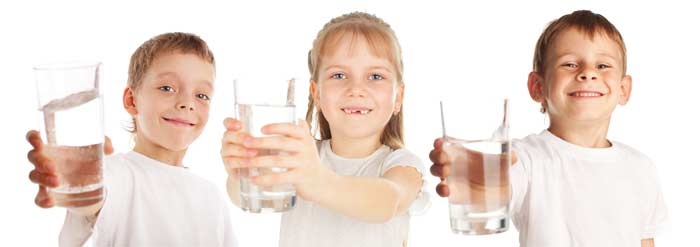
Just because they have smaller bodies does not mean they need less of it. Water is in fact one of the most important nutrients for children. Often times when we read tips for nutrition for our children, they leave out important information about the intake of healthy fluids.
According to a study published in Archives of Diseases in Childhood, more than 70% of preschool children never drink plain water! What are they drinking? Drinks made with sugar, fruit juice, acids, or sugar substitutes. Yes, these drinks all have water in them, but these drinks also dehydrate your body because your body needs water to process these sugary drinks. Second, another health problem these sugary drinks cause correlates with weight gain. Many experts believe that these sugar filled drinks are a major contributor to childhood obesity. According to the Mayo Clinic, over the past 30 years, the rate of obesity in the United States has more than doubled for preschoolers and adolescents and more than tripled in children ages 6 to 11. With all this said, how can water benefit our body and especially our children? Our body’s entire anatomy depends on water for their functioning. Water is the only way our body is able to flush out our toxins before they can become poisonous in our body. Therefore, it is important that both adults and children get the proper amount of water that they need.
Water not only keeps children healthy, but also will help them perform better in school. See, dehydration leads to a reduction in both mental and physical performance. These results can be shown in the classroom! Long-term chronic dehydration may cause health problems and illnesses.
Because many schools have inadequate water resources, parents and teachers should regularly encourage children to drink water at home, and even bring their own to school. Children should especially drink water after taking part in sports, such as in gym class. As stated above, even a small degree of dehydration can lead to a reduction of mental and physical performance. So, not having access to that water, or not being hydrated before school, can lead to poor concentration in the classroom, which could mean not as much participation, and even lower test scores.
Contrary to what people may think about size, although children are smaller than adults, they need to consume more water. A boy between the ages of 11 and 14 needs to drink 3,3 liters of water per day, and a girl the same age needs 2.8 liters per day. A recent survey revealed that 65% of school aged children between the ages of five and 14 drink less water than they should.
Children are at a much greater risk of dehydration, as the process can begin much more rapidly in them. Once the body is dehydrated, the internal temperature rises and the body, particularly the brain, overheats. Since children are still growing, there is all the more need to keep the body hydrated so that it functions properly. Children should always have unlimited access to safe drinking water. A loss of 2% of body fluids causes a 20% reduction in performance in both physical and mental activities. Dehydration in excess of 3% may lead to heat stroke, a condition to which children are much more prone than adults are.
Another reason why children should drink up is that their thirst mechanisms are less developed than adults', and tend to appear after dehydration has already set in. Children should therefore be encouraged to drink water even if they are not thirsty. Headaches, irritability and sleepiness are often signs of dehydration. Of course, children are bombarded with ads of cool soft drinks, but parents, please note that water is a far better choice. Since water is such an important component to our physiology, it would make sense that the quality of water should be just as important as the quantity. Therefore, your drinking water should always be clean and free of contaminants. Now the hard part is getting those kids to drink on a daily basis!
Tips For Getting Your Children To Drink More Water
Keep the water cold, kids often think room temperature water is distasteful. Allow your child to choose their favorite cup or silly straw to be used only with water. If they want to use that cup, they must pour water in it! Bright colored pitchers or even fun shaped ice cubes will attract your kids. Save the sugary and carbonated drinks for a special treat, such as the movies or out to dinner. Water for children is an important and healthy habit to implement whilst they are young. This way they will grow up teaching their kids the same thing! Children disregard water fountains at school and make their way to the soda machines. This is mainly because kids think that water has no flavor thus making it a second or even third choice drink. Don’t forget to be a good role model and drink plenty of water yourself! Encouraging water consumption can help make a positive change in the entire family.



